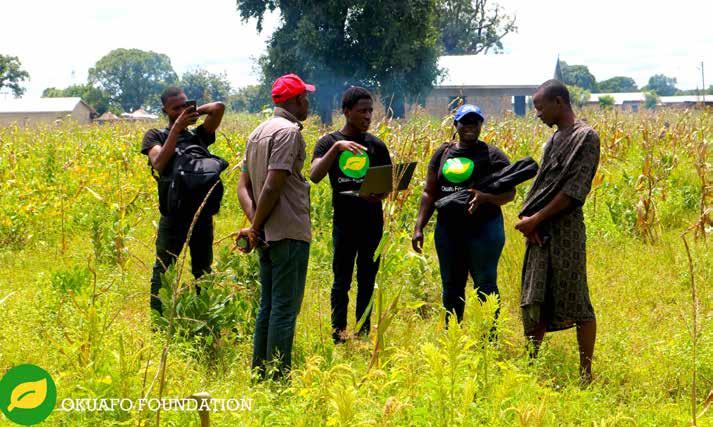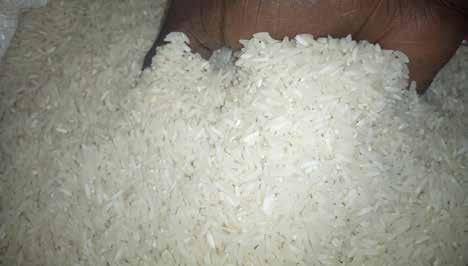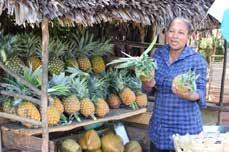NEWS
IFAD supports projects that increase agricultural productivity and incomes in Madagascar Rural development projects financed and supported by the International Fund for Agricultural Development (IFAD) have helped to reduce rural poverty and increase rural entrepreneurship in Madagascar, according to a new report presented today.
T
benefited from training and outreach activities, which are essential for the development of our beneficiaries’ capacities and the dissemination of improved production techniques”, said Fabrizio Felloni, Interim Officer-in-Charge, IOE.
he report, prepared by IFAD’s Independent Office of Evaluation (IOE), reviews the joint work of IFAD and the Government of Madagascar over the past seven years (20132019), covering six projects with a total project cost of US$510 million, of which 59 per cent was financed by IFAD. The evaluation report highlights achievements as well as areas for further improvement. IFAD- supported projects aim to raise the incomes and improve livelihoods, food security and living conditions of the world’s poorest people, who live in rural areas of developing countries. In the years after the 2009-2012 political crisis, IFADsupported projects helped rural poor by providing them with the abilities and skills to improve their productivity and better capitalize on economic opportunities. Several projects introduced innovations into Madagascar, leading to positive results. For instance, IFAD was successful in integrating a large number of microenterprises and small businesses into high-value sectors by pairing farmers’ organizations with market operators, which improved farmers’ access to the markets. According to the report, the creation of nearly 400 of these pairs attracted over US$5.4 million in private sector investments.
“We are quite proud of our gains in Madagascar in terms of rural productivity, incomes and entrepreneurship. Linking farmers with market operators was key for improving economic opportunities in rural areas”, said Sara MbagoBhunu, Regional Director of IFAD’s East and Southern Africa Division (ESA). IFAD played a key role in improving access of rural entrepreneurs to productive assets, support services and financial services. The report states that IFAD helped create networks of service providers, and collaboration and support platforms, thus contributing to the development of rural entrepreneurship. Capacity development and training for young farmers helped them set up and develop their own businesses. “Approximately 70,000 people
IFAD’s work in the country is not over, however, and he went on to describe some of the areas for future work. “The report shows that there is a need to enhance the efficiency and sustainability of the operations, by better engaging key actors such as microfinance institutions, better defining the geographical reach of operations and further strengthening capacity development and skills,” Felloni said. “Additional efforts are also needed to integrate the most vulnerable into the country strategy and programme. The evaluation recommends to fine tune targeting, providing more subsidies for income-generating activities and credit to help the most vulnerable people participate fully in these activities.” According to the evaluation report, the management of natural resources and adaptation to climate change impacts needs to become a key objective in IFAD’s next country strategy for Madagascar. IFAD is looking at how it can improve work in this area in order to ensure sustainability and improve the livelihoods of the rural poor.
Sierra Leone’s varsity signs MoU with AVDP for oil palm project
N
jala University Sierra Leone has signed a US $ 191m Memorandum of Understanding with the Agriculture Value Chain Development Project (AVDP) to implement an Oil Palm project at the University Secretariat.
of Agriculture and the Project Management Unit of AVDP to Njala Campus. He assured the AVDP Project Management Unit and the Deputy Minister that his staff at the School of Agriculture have all what it takes to implement the project.
School of Agriculture and Food Science, praised the Acting Vice Chancellor and Principal for the support accorded to the School of Agriculture in actualizing the eventual signing of the MOU.
The project is funded by the International Fund for Agricultural Development (IFAD) and is geared towards nursing around 540, 000 oil palm seedlings in the next three months for onward distribution to fifteen districts across the country.
On his part, the deputy minister of Agriculture, Dr Abdu Karim noted that the New Direction Government was not only keen in improving agriculture for farmers but it is also committed to building the capacity of key institutions like Njala University to enhance national agricultural promotion. While giving the vote of thanks, Dr Alieu Bah, Head of Department, Crop Science,
He underscored the point that the project would increase the profile of the University to once more provide jobs and enhance the capacity of women and youths in the surrounding communities. He continued that Njala University would also benefit from tools and training for its students during the project implementation stage.
Acting Vice Chancellor and Principal, Professor Osman Sankoh welcomed the Deputy Minister
8 | May - June 2020





















